
Why is Hong Kong so superstitious?
On a hot and humid day in Hong Kong, local finance worker Wai Li is visiting Wong Tai Sin, the city’s busiest temple, to use a fortune-telling practice known as kau cim.
The popular practice involves shaking a tube filled with bamboo “fortune sticks”, numbered 1-100, until one of the sticks falls onto the ground. Each stick has a corresponding story that, when interpreted by the temple’s resident fortune-tellers, gives an opportunity to get a glimpse of your future.
Li kneels on a prayer cushion in front of the temple’s main altar, closes her eyes and begins shaking the tube of fortune sticks while focusing on the question she wants answered. A few minutes later the stick numbered 24 falls to the ground. Proceeding to the temple’s fortune-telling arcade – a two-storey covered passageway containing 161 booths – Li meets Master Joseph, a veteran fortune teller of 20 years, who interprets her fortune stick in relation to the career guidance that she seeks.

Sitting across from her in his booth, Master Joseph tells Li not to expect any advancement or promotions this year and that she will likely encounter a few frustrations on the job front. Overall, he says, her luck will be average.
Li, who has visited the temple numerous times in the past, believes the reading is accurate. “Wong Tai Sin has never failed me before,” she said. “I always come here whenever I have questions or decisions to make about my future. I feel it’s accurate; it has been in the past.”
Li is not religious but, like many of the 10,000 daily visitors that pass through the temple, she’s open-minded when it comes to local superstitious practices. “If I’m honest, I think a lot of Hong Kong people are superstitious in some ways. Most people here will do things to either increase their luck or avoid bad luck.”
It was superstition, Li said, that prevented her from renting a new flat recently. “The management of the building offered me room 1404,” said Li. “I wouldn't even view the flat as that number in Cantonese sounds like ‘will certainly die’. I don't want to take the risk of living there, even though they offered me a steep discount on rent.”
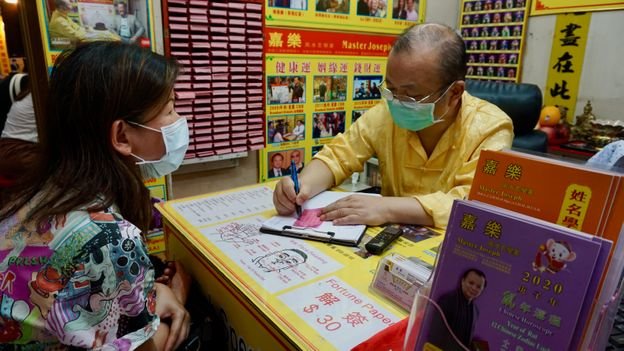
Li is not alone in actively avoiding or fearing anything to do with the number four, something that is known as “tetraphobia”. In Cantonese, four sounds similar to the word for death. Fourteen and 24 are considered even more unlucky, since 14 sounds like “will certainly die” and 24 sounds like “easy to die”. Apartment buildings, hotels, offices and even hospitals in the city often skip floors containing the number.
“It’s a superstitious thing,” said John Choi, who has worked as a feng shui master in Hong Kong for more than 10 years. “Even in my apartment building the floors 40 to 49 do not exist. It ends with 39 and then it starts with the 50th floor again. Then there’s no 4th floor, 14th floor, 24th floor or 54th floor.”
Beyond missing floors, another common sight outside buildings and homes across the city are Tu Di Gong shrines. Usually located outside the main entrance of buildings, these small shrines are dedicated to the Chinese deity Tudi Gong, God of the Soil and the Ground, who is believed to keep away negative energy or ghosts, and bless the people living on his grounds.
“Many people here believe gods and spirits have great power to alter a person's luck or fate,” said Choi. “You might find many shops have a Tu Di Gong shrine situated next to their main entrance. In a similar sense, it’s like a management office that keeps intruders away from entering the shop.”
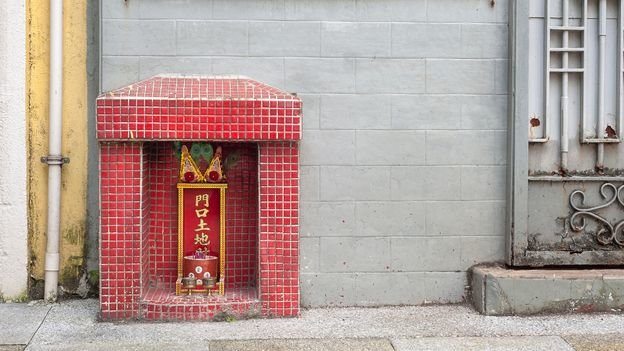
Choi says that the highly competitive nature of the city is what drives many people to adopt superstitious beliefs to try and boost their luck and opportunities.
“In a place so competitive, how can you outperform the others?” said Choi. “The only thing you can do is to use feng shui to help boost your luck.”
Feng shui, literally “wind and water”, is the ancient Chinese practice of using energy forces to harmonise individuals with their surrounding environment to bring better fortune and health. A form of geomancy (the practice of arranging or placing buildings or other sites auspiciously), today it is banned in mainland China by the Communist Party as a “feudal superstition”, as it goes against the party’s core belief in Marxism.
“When they first banned feng shui in China, a lot of the feng shui masters fled and came to Hong Kong,” said Choi. “Some of them also went to Taiwan for the same reasons.”
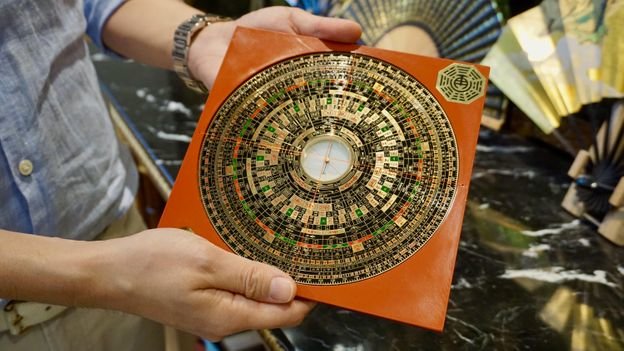
Today, feng shui remains popular in Hong Kong, and Choi says around 40% of building developers still consult a feng shui master to advise on the most auspicious design of their projects. Consultation prices typically range from HK$8/sq ft with a normal master, to HK$30/sq ft with a high-end master. If it is a new building project, it can range from HK$1m to a few million dollars per project.
Most of the skyscrapers in the city’s central business district are considered feng shui buildings. In fact, many of their design features are famously influenced by the ancient practice.
Experts say there is even a feng shui battle occurring in the city centre. The Bank of China skyscraper is said to resemble a blade that is cutting the fortune of surrounding buildings with its inauspicious energy known as “sha qi”, which means “killing energy”. The neighbouring HSBC building is alleged to have added two cannon-like objects (service winches) on its rooftop as a defence.
Shortly after the Bank of China Tower was completed in 1989, HSBC’s share price dropped to a historical low. To deflect the negative energy, HSBC supposedly pointed its cannon-like objects directly at the Bank of China. Since then, according to legend, HSBC’s performance has improved.
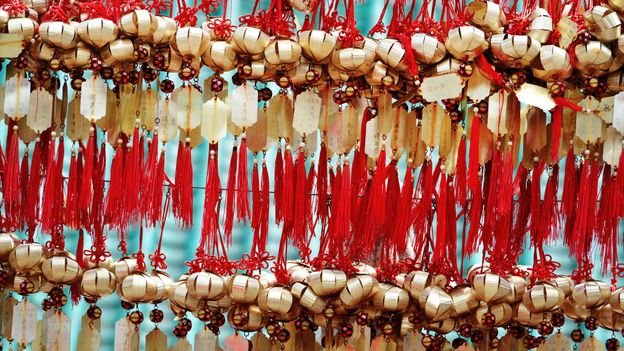
After lengthy consultations with feng shui experts, HSBC also positioned two bronze lions directly in front of its main entrance. In feng shui, lions are a symbol of protection and of wealth and social status. Given that HSBC is the sixth-largest bank in the world, some locals like to stroke the lions’ noses and paws in the hope that some of their good feng shui fortune will rub off on them.
“We believe touching some auspicious feng shui objects can bring good luck to ourselves,” said Choi. It's similar, he says, to hanging out with lucky people – you will find yourself exposed to more good opportunities, but there are never any guarantees. “To achieve success, there is an old Chinese adage that says 70% relies on your hard work, 30% relies on your luck.”
Choi mostly consults on designing interior spaces to ensure the best feng shui for his clients. If a building has recently been erected, he will go into the unit and calculate where to position the doors to bring optimal luck. “For any unit, the door is a critical thing,” he said. “The door is about bringing in luck and prosperity. We can align the door at a very auspicious angle and install it at an auspicious time using a feng shui compass to do calculations.” He also advises clients on the optimal feng shui settings for their homes using their birthdate to determine the best direction for things.
According to Choi, feng shui doesn’t have to be expensive. The most economical way is to place feng shui ornaments in certain areas. Mostly you will see wu lou – meaning “the giver of life”. These small objects, often made of brass and shaped like a gourd, can be specifically positioned to absorb negative energy and minimise the effects of sickness and bad luck.
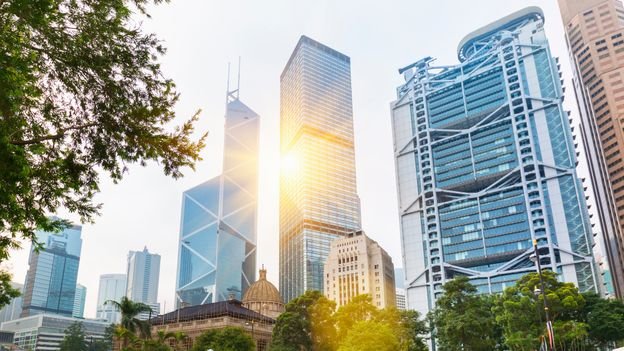
Superstitious beliefs in Hong Kong also extend to the deceased. During festivals to honour and venerate deceased ancestors, among them the tomb-sweeping day known as Qingming festival held in April, mourners will burn joss paper representations of money, clothes, houses and even the latest gadgets like smartphones and TVs. It's believed these offerings will enable the deceased to have a happy and prosperous afterlife.
We believe that if you look after the ancestors they will bless you in return,” said Choi. “When my father died he was quite poor at the time. So we burnt a lot of things for him so that he could be rich in the afterlife. Even I did it. This is a superstitious society after all.”
The reasons behind Hong Kong’s rich repertoire of superstitious beliefs are hard to pinpoint. Having been a former British colony for more than 150 years and absorbing both Eastern and Western beliefs, today many residents believe in popular superstitions from both cultures. For example, Hong Kongers will avoid walking under ladders (considered bad luck in the West) as well as avoiding giving a clock as a gift (considered bad luck in Chinese, as the word for clock sounds similar to attending and paying respects at a funeral).
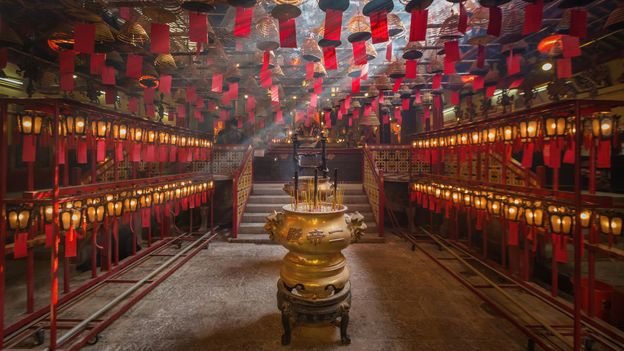
Yan Zhang, a professor at the National University of Singapore who has authored studies on the role superstitious rituals play in warding off bad luck, says the most prominent reason why people believe in superstitions is to gain a sense of control over their environment.
“Performing superstitious actions makes people feel a sense of control, which makes them feel less anxious or nervous,” said Zhang. “Religion, science and superstition can all help people feel a sense of control and comfort. Hong Kong is not a particularly religious place, so to feel better, one needs to rely on either science or superstition.”
But whatever the cause, the city’s superstitious beliefs are unlikely to disappear anytime soon. “Superstitious beliefs may be updated over time when people know better how certain things work,” said Zhang. “However, I don’t anticipate superstitious beliefs will go away completely. Given people can never have full control over their life, superstitious beliefs will stay for as long as we can imagine.”










